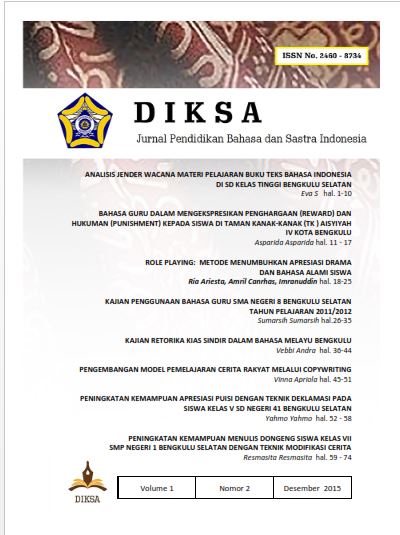Main Article Content
Abstract
The research on novel Perahu Kertas by Dewi Lestari, is a research using Genetic Strukturalisme approach. This research aims to determine the intrinsic and extrinsik elements of the novel. The method using qualitive descriptive. The focus of the research are (1) the structure of Perahu Kertas novel that creates its meaning as a whole, (2) social life of the author Dewi Lestari associated with the novel, (3) Indonesian historical bacground or social events conditioned the birth of this novel. The result showed that loving problem, morality, social, education, and profession of the themes of this novel Perahu Kertas. As someone who is konwledgeable, its write gives an understanding about humanity and morality values to people. According to sociological view of Dewi Lestari in this novel and the background of history behind the emergence of Perahu Kertas , a novel by Dewi Lestari.
Keywords
Article Details
Authors who publish with this journal agree to the following terms:
- Authors retain copyright and grant the journal right of first publication with the work simultaneously licensed under a Creative Commons Attribution License that allows others to share the work with an acknowledgment of the work's authorship and initial publication in this journal.
- Authors are able to enter into separate, additional contractual arrangements for the non-exclusive distribution of the journal's published version of the work (e.g., post it to an institutional repository or publish it in a book), with an acknowledgment of its initial publication in this journal.
- Authors are permitted and encouraged to post their work online (e.g., in institutional repositories or on their website) prior to and during the submission process, as it can lead to productive exchanges, as well as earlier and greater citation of published work (See The Effect of Open Access).
References
- Aminudin. 2000. Pengantar Apresiasi Karya Sastra. Bandung: Sinar Baru Algensindo.
- Aminudin. 1990. Penelitian Kualitatif: dalam Bidang Bahasa dan Sastra. Malang: Yayasan Asah Asih Asuh.
- Damono, Supardi Djoko. 1984. Sosiologi Sastra Sebuah Pengantar Ringkas. Jakarta: Pusat Pembinaan dan Pengembangan Bahasa Depdikbud.
- Endraswara, Suwardi. 2003. Metode Penelitian Sastra: Epistemology, Model, Teori dan Aplikasi. Yogyakarta: Pustaka Jaya.
- Faruk. 1994. Pengantar Sosiologi Sastra dari Strukturalisme Genetik sampai Post Modernisme. Yogyakarta: Yayasan Untuk Indonesia.
- Faruk. 1999. Hilangnya Pesona Dunia. Yogyakarta: Yayasan Untuk Indonesia.
- Fananie, Zainuddin. 2000. Telaah Sastra. Surakarta: Muhammadiyah Universitas Press.
- Goldmann, Lucien. 1975. Towards a sociology Of The Novel (Translate From The French by Alan Sheriden). London. The Cambridge University Press.
- Jabrohim. 2001. Metode Penelitian Sastra. Yogyakarta: Hanindita.
- Junus, Umar. 1988. Karya sebagai Sumber Makna Pengantar Strukturalisme. Kuala Lumpur: Dewan Bahasa dan Pustaka Kementrian Pendidikan Malaysia.
- Kutha Nyoman, Ratna. 2007. Estetika Sastra dan Budaya. Yogyakarta: Pustaka Pelajar.
- Kutha Nyoman, Ratna. 2009. Teori, Metode, dan Teknik: Penelitian Sastra. Yogyakarta: Pustaka Pelajar.
- Kuntjara, Ester. 2006. Penelitian Kebudayaan Sebuah Panduan Praktis. Yogyakarta: Graha Ilmu.
- Lestari, Dewi. 2012. Perahu Kertas: Yogyakarta: Bentang Pustaka.
- Luxemburg, Jan Van dkk. 1991. Tentang Sastra. Jakarta: Intermasa.
- Luxemburg, Jan Van dkk. 1992. Pengantar Sastra. Jakarta: Gramedia.
- Moleong, Lexy J. 2005. Metodologi Penelitian Kualitatif. Bandung: Remaja Rosdakarya.
- Nugiyantoro, Burhan. 2007. Teori Pengkajian Fiksi. Yogyakarta: Gadjah mada University Press.
- Rahmanto, Hariyanto. 1997. Cerita Rekaan dan Drama. Jakarta: Departemen Pendidikan dan kebudayaan Bagian Proyek Penataran Guru SLTP Setara DIII.
- Sayuti, A. Suminto. 2000. Berkenalan Dengan Prosa. Yogyakarta: Gama Media.
- Semi, Atar. 1993. Kritik Sastra. Bandung: Angkasa.
- Sugiyono. 2008. Memahami Penelitian Kualitatif. Bandung: Alfabeta.
- Sumarjo, Jakob & Saini KM. 1984. Memahami Kesusastraan. Bandung: Alumni Bandung.
- Teeuw, A. 1988. Membaca dan Menilai sastra: Pengantar Teori Sastra. Jakarta: PT Dunia Pustaka Jaya.
- Wellek, Rene dan Austin Warren. 1990. Teori Kesusastraan (Penerjemah: Melani Budianta). Jakarta: Gramedia.
References
Aminudin. 2000. Pengantar Apresiasi Karya Sastra. Bandung: Sinar Baru Algensindo.
Aminudin. 1990. Penelitian Kualitatif: dalam Bidang Bahasa dan Sastra. Malang: Yayasan Asah Asih Asuh.
Damono, Supardi Djoko. 1984. Sosiologi Sastra Sebuah Pengantar Ringkas. Jakarta: Pusat Pembinaan dan Pengembangan Bahasa Depdikbud.
Endraswara, Suwardi. 2003. Metode Penelitian Sastra: Epistemology, Model, Teori dan Aplikasi. Yogyakarta: Pustaka Jaya.
Faruk. 1994. Pengantar Sosiologi Sastra dari Strukturalisme Genetik sampai Post Modernisme. Yogyakarta: Yayasan Untuk Indonesia.
Faruk. 1999. Hilangnya Pesona Dunia. Yogyakarta: Yayasan Untuk Indonesia.
Fananie, Zainuddin. 2000. Telaah Sastra. Surakarta: Muhammadiyah Universitas Press.
Goldmann, Lucien. 1975. Towards a sociology Of The Novel (Translate From The French by Alan Sheriden). London. The Cambridge University Press.
Jabrohim. 2001. Metode Penelitian Sastra. Yogyakarta: Hanindita.
Junus, Umar. 1988. Karya sebagai Sumber Makna Pengantar Strukturalisme. Kuala Lumpur: Dewan Bahasa dan Pustaka Kementrian Pendidikan Malaysia.
Kutha Nyoman, Ratna. 2007. Estetika Sastra dan Budaya. Yogyakarta: Pustaka Pelajar.
Kutha Nyoman, Ratna. 2009. Teori, Metode, dan Teknik: Penelitian Sastra. Yogyakarta: Pustaka Pelajar.
Kuntjara, Ester. 2006. Penelitian Kebudayaan Sebuah Panduan Praktis. Yogyakarta: Graha Ilmu.
Lestari, Dewi. 2012. Perahu Kertas: Yogyakarta: Bentang Pustaka.
Luxemburg, Jan Van dkk. 1991. Tentang Sastra. Jakarta: Intermasa.
Luxemburg, Jan Van dkk. 1992. Pengantar Sastra. Jakarta: Gramedia.
Moleong, Lexy J. 2005. Metodologi Penelitian Kualitatif. Bandung: Remaja Rosdakarya.
Nugiyantoro, Burhan. 2007. Teori Pengkajian Fiksi. Yogyakarta: Gadjah mada University Press.
Rahmanto, Hariyanto. 1997. Cerita Rekaan dan Drama. Jakarta: Departemen Pendidikan dan kebudayaan Bagian Proyek Penataran Guru SLTP Setara DIII.
Sayuti, A. Suminto. 2000. Berkenalan Dengan Prosa. Yogyakarta: Gama Media.
Semi, Atar. 1993. Kritik Sastra. Bandung: Angkasa.
Sugiyono. 2008. Memahami Penelitian Kualitatif. Bandung: Alfabeta.
Sumarjo, Jakob & Saini KM. 1984. Memahami Kesusastraan. Bandung: Alumni Bandung.
Teeuw, A. 1988. Membaca dan Menilai sastra: Pengantar Teori Sastra. Jakarta: PT Dunia Pustaka Jaya.
Wellek, Rene dan Austin Warren. 1990. Teori Kesusastraan (Penerjemah: Melani Budianta). Jakarta: Gramedia.
